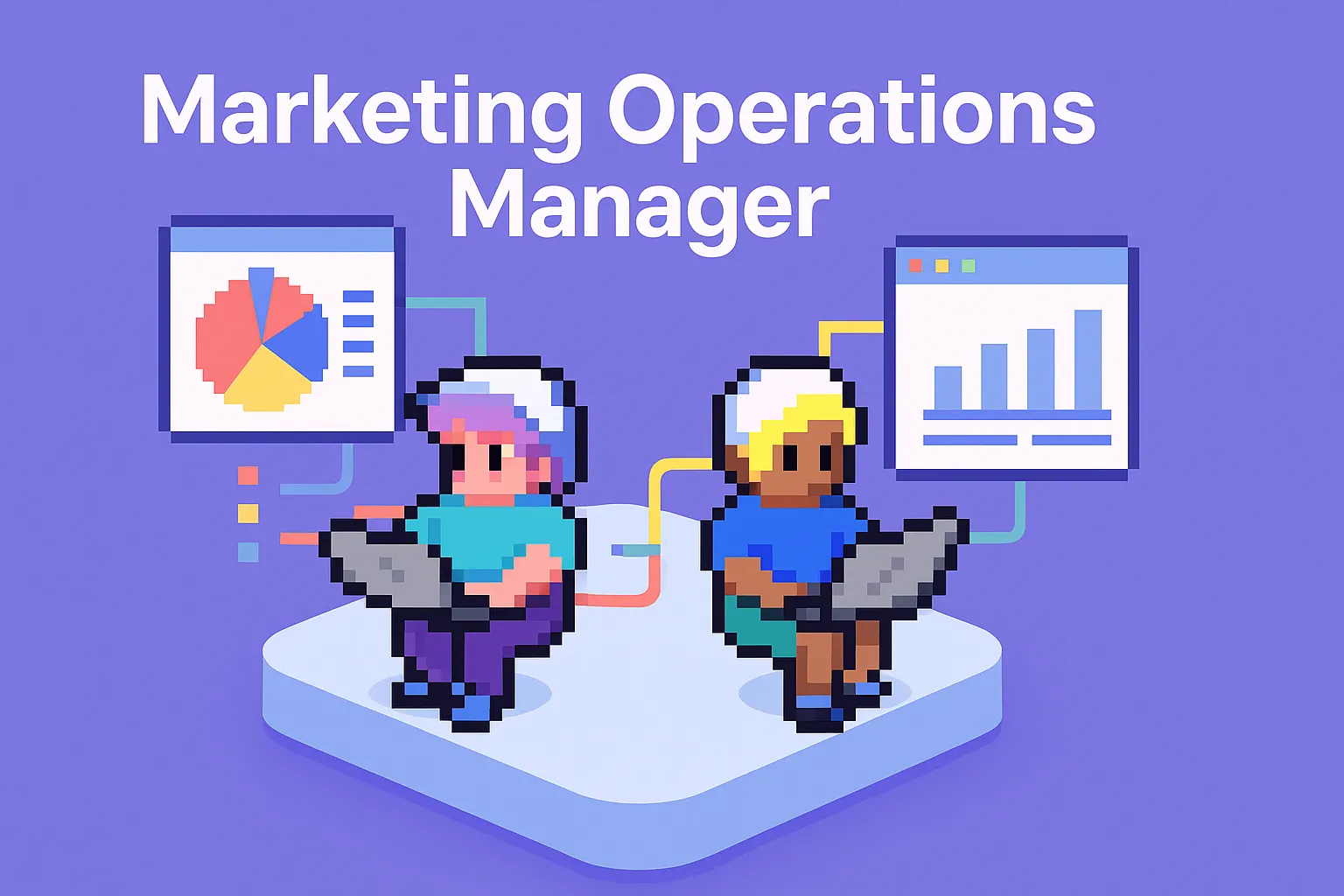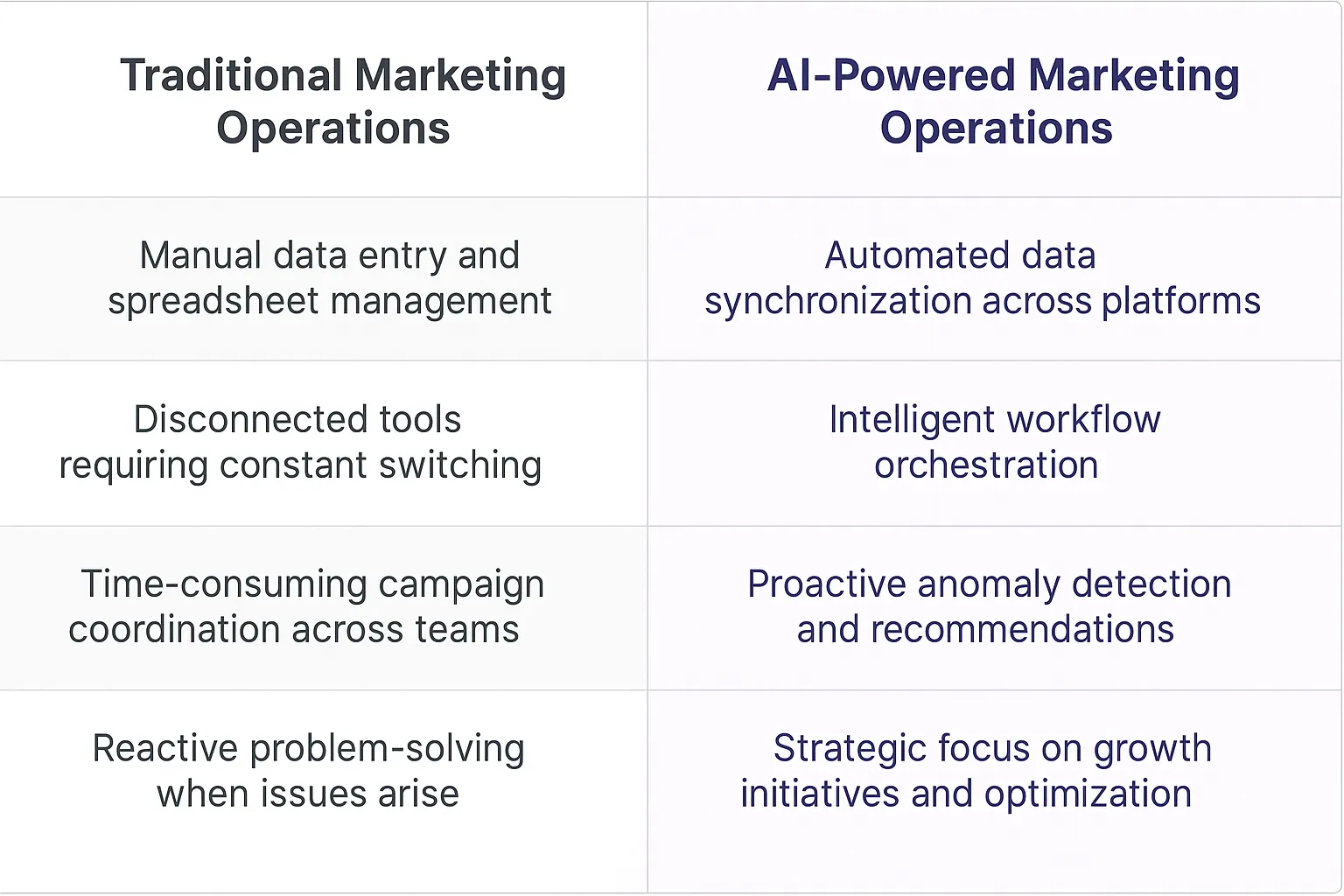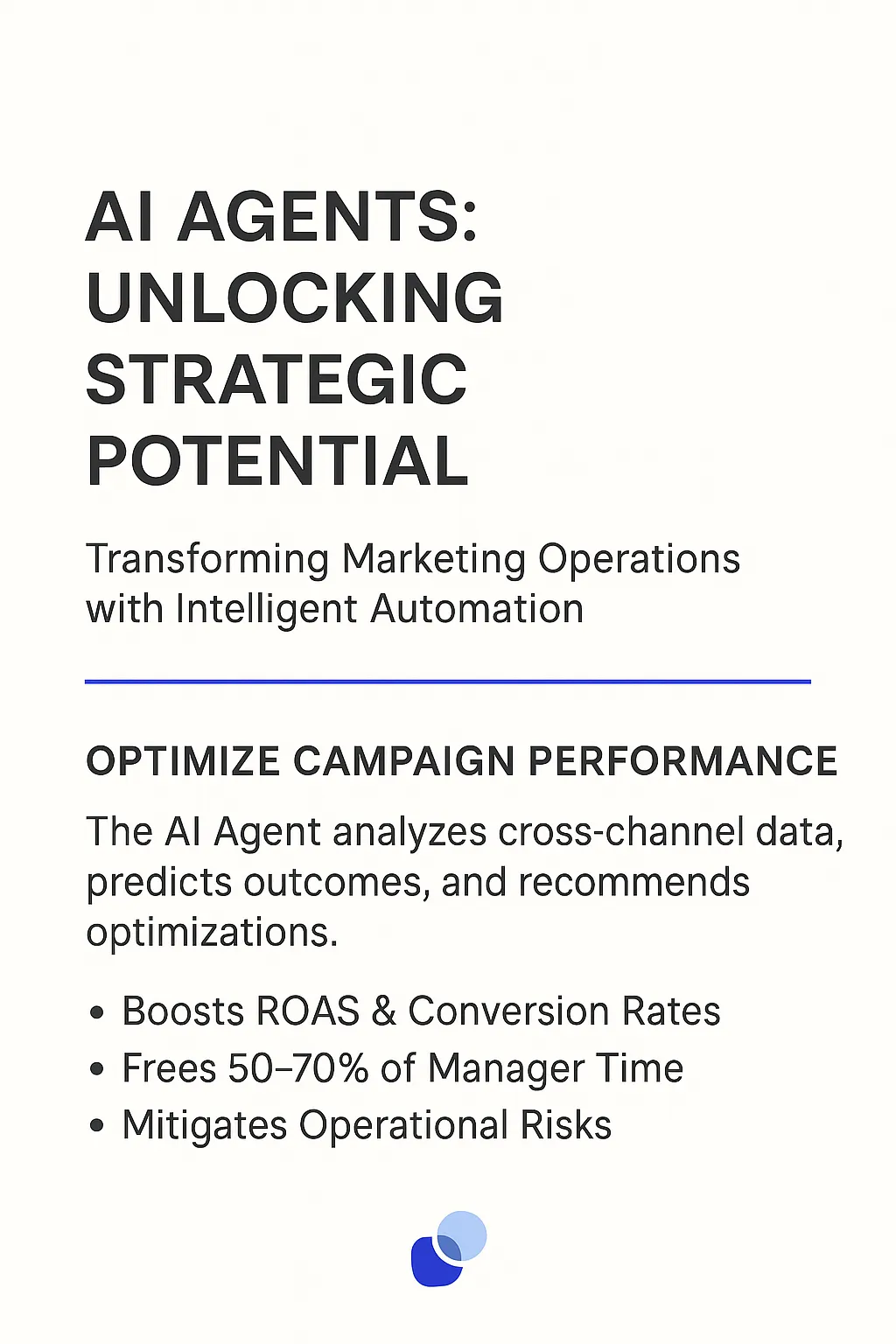Marketing Operations Manager is an AI-powered digital teammate designed specifically for marketing operations teams. It acts as a central nervous system for marketing activities, connecting various marketing tools, managing campaign workflows, and maintaining data integrity across platforms. Unlike traditional automation tools, it learns from your team's processes and adapts to your organization's unique marketing automation needs.

Marketing ops teams traditionally relied on a complex web of disconnected tools and manual processes. They'd spend countless hours copying data between spreadsheets, updating campaign trackers, and manually generating reports. The typical marketing ops manager juggled between 15-20 different tools daily, creating a cognitive load that pulled focus from strategic work.
Teams often cobbled together solutions using basic automation tools, spreadsheet formulas, and endless email threads. This resulted in data silos, version control issues, and the dreaded "who has the latest numbers?" problem that plagues marketing meetings.
Digital teammates fundamentally transform how marketing operations teams work by acting as intelligent connectors across the marketing tech stack. They're like having a specialized ops professional who never sleeps and can process thousands of tasks simultaneously.
The real power comes from their ability to handle complex, multi-step workflows that previously required careful human oversight. For example, when launching campaigns, AI agents can automatically:
Beyond task automation, these digital teammates serve as institutional knowledge banks. They learn from every interaction, campaign, and process, creating a living documentation system that evolves with your organization. This means new team members can get up to speed faster, and best practices are consistently applied across all operations.
The most significant shift is in how marketing ops managers spend their time. Instead of being caught in the weeds of data management and tool coordination, they can focus on strategic initiatives that drive business growth. It's the difference between being a process manager and a strategic advisor to the marketing organization.

The real power of AI agents in marketing operations comes from their ability to handle the complex, data-heavy tasks that typically consume hours of human time. By offloading these responsibilities to digital teammates, marketing operations managers can focus on strategic initiatives that drive business growth. The agent becomes an extension of the team, learning from each interaction and continuously improving its ability to support marketing operations.

The versatility of AI agents in Marketing Operations makes them particularly valuable across different business environments. Marketing Ops teams face unique challenges - from managing complex campaign data to orchestrating cross-channel initiatives. Let me break down some real-world applications I've observed working with growth teams.
When you look at how digital teammates integrate into Marketing Operations, you'll find they excel at both strategic and tactical levels. They can analyze campaign performance metrics while simultaneously helping coordinate asset delivery schedules. This dual capability creates interesting dynamics in how marketing teams operate.
What's particularly fascinating is how AI agents adapt to different company stages and marketing maturity levels. A Series A startup might leverage them for rapid experimentation and market validation, while enterprise teams often deploy them for complex multi-region campaign orchestration. The key insight here is that AI's role evolves with the organization's needs - much like how product-market fit evolves through company growth stages.
The following industry examples demonstrate how Marketing Operations teams are integrating AI agents into their core workflows, creating new operational models that blend human creativity with computational precision.
When I talk to e-commerce marketing teams, their biggest pain point isn't coming up with creative campaign ideas - it's the operational overhead of executing them. Marketing Ops Managers spend countless hours coordinating between teams, updating campaign trackers, and ensuring promotional calendars align across channels.
A Marketing Operations Manager AI Agent fundamentally changes this dynamic. Take the example of a mid-sized DTC brand running 15-20 promotional campaigns per month across email, social, and their website. The AI agent owns the operational backbone - it maintains a single source of truth for campaign dates, creative requirements, and performance metrics.
The real magic happens in the details: When the social team adjusts a campaign timeline, the AI agent automatically updates dependencies in email sequences and website banners. It flags potential conflicts like overlapping promotions targeting the same customer segment. It even generates standardized campaign briefs by pulling historical performance data and customer insights.
What's fascinating is how this shifts the Marketing Ops Manager's role from tactical coordination to strategic optimization. Instead of chasing status updates, they can focus on analyzing cross-channel performance patterns and identifying opportunities to improve campaign effectiveness.
One DTC brand I advised saw their campaign execution time drop by 40% after implementing an AI Marketing Ops Manager. But the more interesting metric was that their campaign performance improved by 25% - simply because the team could spend more time optimizing and less time coordinating.
The key learning: AI agents in marketing operations aren't just about efficiency - they create space for the strategic thinking that actually moves the needle on results.
The SaaS marketing playbook has gotten incredibly complex. I've watched marketing ops teams at growth-stage software companies juggle 50+ tools while trying to maintain consistent messaging across product launches, feature announcements, and content distribution. It's a coordination nightmare that often leads to missed opportunities and diluted impact.
A Marketing Operations Manager AI Agent transforms this chaos into a well-oiled machine. Consider a B2B SaaS company I recently worked with that releases new features every two weeks. Their AI agent orchestrates the entire go-to-market process - from coordinating release notes with the product team to scheduling customer webinars and managing multi-channel announcement campaigns.
The subtle but powerful shift happens in how the AI agent handles dependencies. When product timelines shift (as they inevitably do), it automatically recalibrates the marketing calendar, adjusts content deadlines, and reorganizes the webinar schedule. It maintains alignment between product marketing, content, and demand gen teams without endless email threads and emergency meetings.
What's particularly fascinating is how this changes the nature of marketing operations itself. One Marketing Ops Manager told me: "I used to spend 70% of my time in spreadsheets tracking deliverables. Now I spend that time analyzing which marketing motions actually drive product adoption."
The numbers tell the story: This SaaS company saw their average time-to-market for new features drop from 3 weeks to 5 days. But the more meaningful metric was their feature adoption rate increasing by 60% - because marketing could focus on messaging and positioning instead of logistics.
The insight here is clear: When AI agents handle the operational complexity of modern marketing, teams can focus on the strategic work that drives real business outcomes. It's not about doing the same things faster - it's about fundamentally changing what marketing teams spend their time on.
Marketing Operations Manager AI agents need deep access to your tech stack - and that's where the first wave of challenges hits. These digital teammates require connections to your CRM, marketing automation platforms, analytics tools, and campaign management systems. The integration complexity grows exponentially with each additional marketing tool. We've seen teams struggle particularly with legacy systems that lack modern APIs or have strict data governance policies.
The effectiveness of your Marketing Ops AI agent lives and dies by your data quality. Inconsistent naming conventions, duplicate records, and fragmented customer data across systems can severely limit the agent's ability to make accurate decisions. Many marketing teams discover their data hygiene issues only after implementing an AI agent - leading to a necessary but time-consuming data cleanup phase.
Marketing teams often need to redesign their workflows to maximize AI agent value. This isn't just about technology - it's about changing how people work. Teams must develop new skills to effectively collaborate with AI agents, learning when to trust automated decisions and when human oversight is crucial. The transition period typically takes 3-4 months as teams adjust their daily routines.
Tracking the ROI of a Marketing Ops AI agent isn't straightforward. While some metrics like time saved on routine tasks are easy to measure, others like improved decision quality or reduced error rates require sophisticated tracking mechanisms. Teams need to establish new KPIs and measurement frameworks to accurately assess the agent's impact on marketing operations.
Resistance to AI adoption among marketing team members is real. Some worry about job security, others about losing creative control. Success requires a clear communication strategy about the AI agent's role - it's not replacing humans but augmenting their capabilities. Leadership needs to actively demonstrate how the agent helps team members focus on higher-value strategic work.
Marketing operations often handle sensitive customer data and campaign information. AI agents need robust security protocols and compliance frameworks, especially in regulated industries. Teams must ensure their AI implementation meets data protection requirements like GDPR and CCPA, while maintaining the speed and flexibility marketing operations demand.
The integration of AI agents into marketing operations marks a pivotal shift in how marketing teams function. Through my work with growth teams, I've observed that the most successful implementations aren't just about automation - they're about enabling marketing ops teams to operate at a higher strategic level. The key to success lies in viewing these digital teammates not as replacements, but as catalysts for marketing excellence.
Looking ahead, marketing operations will increasingly become a blend of human strategic thinking and AI-powered execution. Teams that master this combination will have a significant competitive advantage in their ability to scale marketing operations while maintaining quality and consistency. The future of marketing operations isn't about humans versus machines - it's about humans and machines working together to drive unprecedented marketing performance.